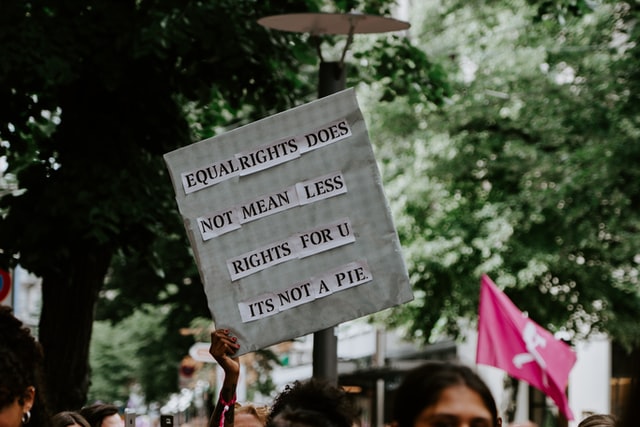Staying Equal after 'I Do'
 I've been thinking a lot about weddings and marriage lately, chiefly because the wonderful video editor behind my weekly YouTube show, Doomsday Happy Hour, left this morning for her wedding (final prep included) and honeymoon. Naturally, this makes me think of the final days before I married my husband, which in our case, included the signing of a prenup.
I've been thinking a lot about weddings and marriage lately, chiefly because the wonderful video editor behind my weekly YouTube show, Doomsday Happy Hour, left this morning for her wedding (final prep included) and honeymoon. Naturally, this makes me think of the final days before I married my husband, which in our case, included the signing of a prenup.
For the record, I requested the prenup. Actually, I insisted on it to protect my premarital savings. However, it became clear that the prenup was important for a second reason: to protect us, but primarily me, in the event our relationship didn't go the distance...
I grew up in the 80s and 90s in what I eventually discerned was an atypical household: my mom was initially the primary, then the only, breadwinner and my dad ultimately became a stay-at-home parent. Ironically, it wasn't until I transferred to an all-girls school around age 12 that I heard about there being a "glass ceiling" for women, and it would be another decade-plus before I believed it was real. Thus, it might come as a surprise to learn that I explicitly made the opposite choice. That is, before my husband and I married, we mutually decided to prioritize his career over mine, especially if we were blessed with children. To be clear, I wasn't planning to become a stay-at-home parent. I was just saying that if we were able to have a family, I would choose to decelerate career-wise in a way that my husband would not. I viewed this as "taking one for the team" -- the team being our family.
 So I was horrified when my husband's prenup lawyer repeatedly suggested he push to cap the amount of his annual income in which I'd be entitled to share. Putting aside the fact that the proposed cap was very low relative to the cost of living in NYC and that it was less than what I usually grossed each year (and I didn't seek to cap his share of my earnings), I envisioned marriage as a 50-50 partnership. We agreed that our division of labor and responsibilities was such that I'd focus more on the home front and him more on his career for the overall benefit of our family. My contributions, even if not income-generating, would be at least as valuable to our family as his, and to devalue them was to devalue me. That kind of marriage left no room for partnership and was not something I wanted any part of.
So I was horrified when my husband's prenup lawyer repeatedly suggested he push to cap the amount of his annual income in which I'd be entitled to share. Putting aside the fact that the proposed cap was very low relative to the cost of living in NYC and that it was less than what I usually grossed each year (and I didn't seek to cap his share of my earnings), I envisioned marriage as a 50-50 partnership. We agreed that our division of labor and responsibilities was such that I'd focus more on the home front and him more on his career for the overall benefit of our family. My contributions, even if not income-generating, would be at least as valuable to our family as his, and to devalue them was to devalue me. That kind of marriage left no room for partnership and was not something I wanted any part of.
Why should you care about this? Well, for the same reason you should care about the comments made by many when news broke last year of Jeff Bezos's impending divorce. A sample exchange:
SM: Everyone keeps talking all of this smack about Jeff Bezos's wife getting half of his fortune. Let me tell you something: the woman makes the man. A strong and supportive woman by your side can make or break an entrepreneur and your life together. He didn’t make his billions alone.
TJ: yes I’m sure the “strong woman at his side” is the reason for Amazon. Get real! Lmfao
TJ: ...put it to a poll. Ask all the divorced men on here to chime in and ask if they feel their former partners deserve half of what they worked their lives for... and ask them if they gave it up willingly. Let the people speak...
MK: She wrote the business plan and was Amazon's first employee...
AW: These things need to be handled on a case by case basis. I don’t read up on Bezos. Maybe she did support him and contributed ideas. But, let’s take someone like Linda Bollea (Hogan). She had nothing to do with the success of Hulk Hogan... yet she took an obscene amount in the divorce that she flaunted.
 Believe it or not, the real problem isn't TJ (whose most misogynistic comments I’ve omitted). I assume natural selection will take care of him. The main problem is AW -- and even well-meaning MK -- as they suggest that MacKenzie Bezos (or Linda Hogan) needed to participate in her husband's business to be deserving of an even share of the wealth he accumulated during their marriage. This doesn't just devalue the contribution of women as mothers, it says stay-at-home parents (usually moms) are worthless.
Believe it or not, the real problem isn't TJ (whose most misogynistic comments I’ve omitted). I assume natural selection will take care of him. The main problem is AW -- and even well-meaning MK -- as they suggest that MacKenzie Bezos (or Linda Hogan) needed to participate in her husband's business to be deserving of an even share of the wealth he accumulated during their marriage. This doesn't just devalue the contribution of women as mothers, it says stay-at-home parents (usually moms) are worthless.
Equally problematic is the idea that absent a prenup, this should be evaluated on a case-by-case basis. The problem here has nothing to do with MacKenzie Bezos. Even if a judge had only given her 1/100th of what Jeff Bezos accumulated during their marriage, she'd still be a billionaire. But we don't have one law for the rich and one for the rest of us, nor should we. This means that your average dissolving marriage would be subject to the same case-by-case, potentially whimsical, decision-making AW proposes. And if women can't know that they'll be treated fairly, we're actually making it unsafe for them (us) to consider all options and choose the division of labor that’s best for our families.
 Let's say a mom (or dad - but it's usually mom) makes as much after taxes as childcare would cost for her non-school-age children. Assuming she's a member of a two-income household, she should be able to freely decide (with her partner) whether it makes sense to convert to a one-income household at least until the youngest is in school. After all, it's hard to find someone who'll care for your children as well and lovingly as a parent. This way, mom (or dad) will never have to worry about working so late (s)he might not get back before daycare closes. And what babysitter is going to meet the needs of a child with a learning disability or special needs as completely as a dedicated parent?
Let's say a mom (or dad - but it's usually mom) makes as much after taxes as childcare would cost for her non-school-age children. Assuming she's a member of a two-income household, she should be able to freely decide (with her partner) whether it makes sense to convert to a one-income household at least until the youngest is in school. After all, it's hard to find someone who'll care for your children as well and lovingly as a parent. This way, mom (or dad) will never have to worry about working so late (s)he might not get back before daycare closes. And what babysitter is going to meet the needs of a child with a learning disability or special needs as completely as a dedicated parent?
 Now, what happens when mom goes back to work after what will likely be a multi-year absence? And if we know that women have a hard time availing themselves of even longtime employers' maternity leave policies without suffering career-wise, how much harder will it be for this mom to get back into work, and thrive? So maybe it makes sense to stay at home past kindergarten, particularly if one child needs special attention. Or maybe mom goes back to work when the youngest starts school but then the couple splits.
Now, what happens when mom goes back to work after what will likely be a multi-year absence? And if we know that women have a hard time availing themselves of even longtime employers' maternity leave policies without suffering career-wise, how much harder will it be for this mom to get back into work, and thrive? So maybe it makes sense to stay at home past kindergarten, particularly if one child needs special attention. Or maybe mom goes back to work when the youngest starts school but then the couple splits.
One divorced friend whose husband cast her away after cheating on her (as she battled breast cancer) noted she wasn't as well off post-divorce, but many of her friends whose ex-husbands had behaved similarly were left with "not a pot to piss in." When we talk of progress for women, we usually talk about opening up male-dominated professions, ensuring equal pay for equal work, and expanding maternity leave (ideally without hampering career growth). Rightly so. But if we want women to be valued equally, we must recognize and value every contribution they make, and the reality remains that, whether they work outside the house or not, women are usually the primary caregiving parent.
In the same exchange referenced above, DEW asked: "Let's say his wife at the same time was building her company.... let's call it BAMAZON. She became the billionaire and his company Amazon failed. They get divorced. Is he entitled to half?" The only two replies came from women, SM and EP -- the former wrote "yes he should get 50%" and the latter "absolutely."
This is not just a women's issue. This is a human issue. In the event of divorce (which I hope will never happen), my dad should get half of my mom's earnings. Period. But my dad was the only stay-at-home father in my class (I think in my entire school), and when my mom's firm had events for partners and their spouses, my father was the only male among the spouses. Until stay-at-home dads are not anomalies at their kids’ schools, until there are multiple husbands among the groups of partners' spouses, this is a woman's issue -- and a children's issue, and a family issue. And I believe that once we address it, conversations around equal pay, maternity leave, etc. will become more productive.
 EJ Peters Bio
EJ Peters Bio
EJ Peters was a lawyer (for all of two seconds) before realizing the law was a total mismatch. Just as the recession was starting in late 2008, she switched careers and became a headhunter. She has nearly 12 years of experience as a recruiter (and unofficial career coach and confidant/adviser). Further, she's spent the past 5+ years trying to convince her husband that she does in fact have a sense of humor -- and a good one. Most importantly, she's mom to two diaper-wearing little ones. She began competitive potty-training with them this summer. It's not going well.






